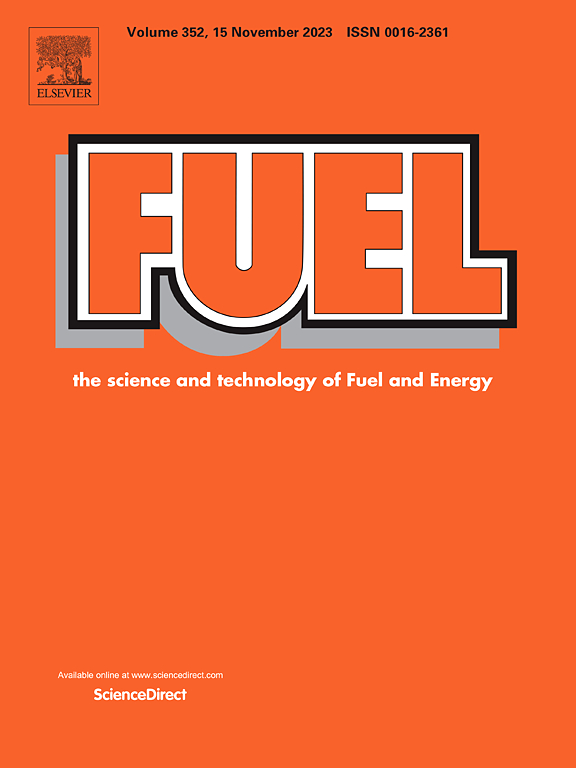高密度燃料用煤焦油衍生物的催化扩环加氢:改性剂评价及动力学解析
IF 7.5
1区 工程技术
Q2 ENERGY & FUELS
引用次数: 0
摘要
为了解决煤焦油(CT)燃料密度不足的瓶颈,本研究提出了一种分子基取向的扩环改性策略,以提高缩合多环芳烃(PAHs)的含量,并优化高密度燃料生产的加氢工艺。采用呋喃(FA)、马来酸酐(MA)、NA酸酐(NA) 3种改性剂与Lewis酸催化剂(AlCl3、FeCl3等)联合对中低温CT进行改性。采用GC-MS、FT-IR、拉曼光谱和13C NMR对改性产物进行了表征。在优化条件下,采用Ni-Mo/γ-Al2O3催化剂,通过密度、粘度、热值和加氢实验对燃料性能进行了评价。改性后,三环芳烃含量提高了20%,凝聚芳峰面积提高了450%,石墨化程度提高了120%。MA改性效果最好,得到的氢化产物密度为0.9547 g/mL,热值为42.2 MJ/kg。动力学分析表明,alcl3在100°C下催化24 h的反应是最佳的,涉及Diels-Alder和Friedel-Crafts协同烷基化机制。这项工作开创了一种分子基导向的CT扩环策略,克服了传统加氢方法在提高环数方面的局限性,为煤基高密度燃料的开发提供了一条新的途径。本文章由计算机程序翻译,如有差异,请以英文原文为准。

Catalytic ring-expansion and hydrogenation of coal tar derivatives for high-density fuel: Modifier evaluation and kinetic elucidation
To address the bottleneck of insufficient fuel density in Coal Tar (CT), this study proposes a molecular group-oriented ring expansion modification strategy to enhance the content of condensed polycyclic aromatic hydrocarbons (PAHs) and optimize hydrogenation processes for high-density fuel production. Three modifiers—furan (FA), maleic anhydride (MA), and NA anhydride (NA)—combined with Lewis acid catalysts (AlCl3, FeCl3, etc.) were employed to modify low- and medium-temperature CT. The modified products were characterized using GC–MS, FT-IR, Raman spectroscopy, and 13C NMR. Fuel performance was evaluated via density, viscosity, calorific value, and hydrogenation experiments under optimized conditions with a Ni-Mo/γ-Al2O3 catalyst. Post-modification, the tricyclic aromatic hydrocarbon content increased by 20 %, the condensed aromatic peak area rose by 450 %, and the graphitization degree improved by up to 120 %. MA demonstrated the best modification effect, yielding a hydrogenated product with a density of 0.9547 g/mL and a calorific value of 42.2 MJ/kg. Kinetic analysis identified AlCl3-catalyzed reactions at 100 °C for 24 h as optimal, involving synergistic Diels-Alder and Friedel-Crafts alkylation mechanisms. This work pioneers a molecular group-oriented ring expansion strategy for CT, overcoming the limitations of traditional hydrogenation in enhancing ring numbers and offering a novel pathway for coal-based high-density fuel development.
求助全文
通过发布文献求助,成功后即可免费获取论文全文。
去求助
来源期刊

Fuel
工程技术-工程:化工
CiteScore
12.80
自引率
20.30%
发文量
3506
审稿时长
64 days
期刊介绍:
The exploration of energy sources remains a critical matter of study. For the past nine decades, fuel has consistently held the forefront in primary research efforts within the field of energy science. This area of investigation encompasses a wide range of subjects, with a particular emphasis on emerging concerns like environmental factors and pollution.
 求助内容:
求助内容: 应助结果提醒方式:
应助结果提醒方式:


